Monster’s Ball
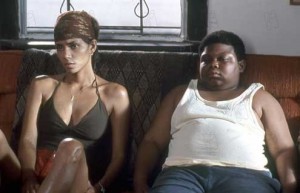 Spoilers everywhere….
Spoilers everywhere….
There’s an odd linking of vomit going throughout Monster’s Ball that I think has never been addressed. Billy Bob throws up in the first scene, but nothing is made of it. It’s just part of the routine. It doesn’t even faze him. And this sort of establishes the way that the people in this world accept these, to most people, truly uncomfortable things, as a part of life that doesn’t need adjusting, but rather just something you do everyday. Later on, when Heath Ledger vomits, it’s not so offensive to Billy Bob that he ruined Puffy’s final walk, it’s more that he broke routine by having an emotional reaction, since he is throwing up because he’s upset. Puffy’s drawing of Ledger has made him feel something for a human being, which is unacceptable to Billy Bob, and is why he regards his son as weak and takes it out on him after the execution in the bathroom.
When Billy Bob vomits after the sex scene, it’s his exorcising of the suffocation that he describes, something he can’t quite explain to Berry, as she sees at as an insult, which is further driven home when Boyle says that the men in his family have a thing for black women, and she recognizes it as a just another routine fulfillment of his chores.
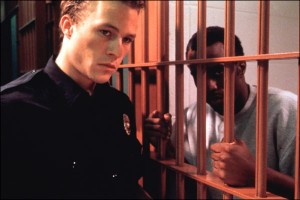 The hooker scenes are linked in this way, there’s a matter of factness to Ledger’s scene where this mutual respect and apathy to the situation, exactly as if he was thanking his waitress for bringing him food, not seeing sex as a possibly pleasurable act, just a need that has to be taken care of and gotten out of the way. Even the religious scene in the film, when the guards all read from the bible before the execution, it all seems so perfunctory, just something they have to do, that is a required task rather than a true expression of emotion and prayer. Berry even points this out once, when her son is killed and the cop tells her that they are going to do an autopsy, and perhaps they might discover more. And she says “Why? He was hit by a car.” This exposes even the hospital’s need to follow unnecessary procedure just to make sure they follow the rules.
The hooker scenes are linked in this way, there’s a matter of factness to Ledger’s scene where this mutual respect and apathy to the situation, exactly as if he was thanking his waitress for bringing him food, not seeing sex as a possibly pleasurable act, just a need that has to be taken care of and gotten out of the way. Even the religious scene in the film, when the guards all read from the bible before the execution, it all seems so perfunctory, just something they have to do, that is a required task rather than a true expression of emotion and prayer. Berry even points this out once, when her son is killed and the cop tells her that they are going to do an autopsy, and perhaps they might discover more. And she says “Why? He was hit by a car.” This exposes even the hospital’s need to follow unnecessary procedure just to make sure they follow the rules.
Even the racism is rote. Billy Bob is not upset at first when the kids show up to see his son, but Peter Boyle reminds him that he is one, and that’s when he gets upset and pulls out his shotgun. The same occurs in the bathroom scene, where Billy Bob’s remembers to be racist when he calls his fellow officer a n****r, and then forgets and calls him Phil, and has to remind him about his rank, rather than his race. It’s as if Billy Bob’s racism isn’t even ingrained in him, it’s a facet of his personality that never quite stuck, but was forced on him.
People talk about how Deliverance, 2000 Maniacs, etc. are these anti-southern movies, but rarely are you going to see how miserable people can be in the south than in this movie. It’s one depressing scene after another, about how people are utterly complacent and accepting in being miserable.
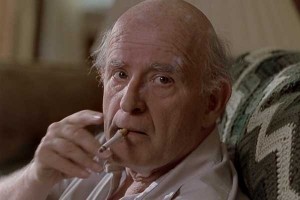 There is an emotional distance with all of the characters that is obvious when you look at their behavior but also in the camera placement and angles themselves. When Berry’s son is run over, she is screaming and banging on the glass, but we can only see here from the other side of the glass, there is no shot of her reaction in close up, no shot that is without a barrier. When Billy Bob is being interviewed after the accident by one of the policeman, it is so plain and matter of fact as to be distressing, that is, if we hadn’t been inundated by this behavior for about an hour already.
There is an emotional distance with all of the characters that is obvious when you look at their behavior but also in the camera placement and angles themselves. When Berry’s son is run over, she is screaming and banging on the glass, but we can only see here from the other side of the glass, there is no shot of her reaction in close up, no shot that is without a barrier. When Billy Bob is being interviewed after the accident by one of the policeman, it is so plain and matter of fact as to be distressing, that is, if we hadn’t been inundated by this behavior for about an hour already.
“What happened to the boy?”
“He died.”
“Oh.”
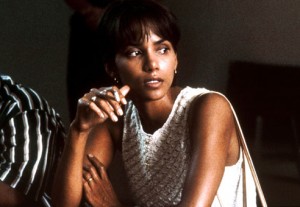 The electrocution is shot from such a distance, in a way that removes us from feeling attached directly to the character. We see the lever being pulled down several times, but it’s just an action. The only time we can see Puffy reacting to the electricity is through the observer’s glass but their non-reactions are actually closer to us than his image. It reminded me a lot of a Wong Kar Wai’s In the Mood For Love, which is a love story that seems more focused on inanimate objects, rather than the lovers themselves. Even the sex scene is shot from quite a distance; Berry’s head is almost never in frame, obscured by camera placement. When they are done, there are no close-ups where she’s even in focus, and since she’s the one who seemed to really get the most of it, both emotionally and physically, so we aren’t allowed to see her clearly.
The electrocution is shot from such a distance, in a way that removes us from feeling attached directly to the character. We see the lever being pulled down several times, but it’s just an action. The only time we can see Puffy reacting to the electricity is through the observer’s glass but their non-reactions are actually closer to us than his image. It reminded me a lot of a Wong Kar Wai’s In the Mood For Love, which is a love story that seems more focused on inanimate objects, rather than the lovers themselves. Even the sex scene is shot from quite a distance; Berry’s head is almost never in frame, obscured by camera placement. When they are done, there are no close-ups where she’s even in focus, and since she’s the one who seemed to really get the most of it, both emotionally and physically, so we aren’t allowed to see her clearly.
The visuals have this almost Oliver Stone/Robert Richardson look to them, but more specifically it’s the colors on people’s faces are almost blending into each other, everyone looks grey and unspecific, their faces lack detail. This adds to the metaphor of the characters ghostlike and dead, as no one seems to have any reaction to anything going on around them. The interior of the diner is so grey, without actually using any specific grays.
No one seems to be taking pleasure in anything they do in the first act of the movie. When you watch Ledger or Berry smoke, it seems just a compulsion, there’s no joy in it, they are acts of nervousness (Berry awaits for the call from Puffy that never comes, Ledger seems to be seething and trying to take out his anger on his cigarette) and any attempt at satisfying a pleasure or an urge, like Berry’s little boy hiding his chocolate, is immediately scolded. Puffy one pleasure, his drawings, is of course only allowed him right before he is executed. People often overlook how important the scene where Puffy, gets upset and starts crying and Ledger comforts him, but in essence, it sets the story going in the direction it takes.
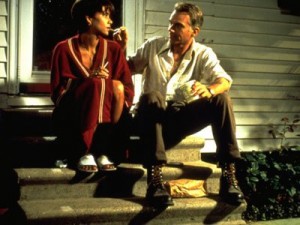 There’s a key joke, probably overlooked since the movie is so deliberately devoid of humor. It has to do with Billy Bob’s compulsion to eat chocolate ice cream (with a plastic spoon). Billy Bob points out how he eats the ice cream all the time but it doesn’t really taste like much, but when in the final scene, as Berry has discovered the drawings, and he sits on the front steps with her, we see him actually smiling and sharing the ice cream, as if the first time he enjoyed. This is, of course, is directly after a scene in which he performed cunnilingus rather successfully on her, he “ate chocolate and made her cream,” and now suddenly he appreciates the taste.
There’s a key joke, probably overlooked since the movie is so deliberately devoid of humor. It has to do with Billy Bob’s compulsion to eat chocolate ice cream (with a plastic spoon). Billy Bob points out how he eats the ice cream all the time but it doesn’t really taste like much, but when in the final scene, as Berry has discovered the drawings, and he sits on the front steps with her, we see him actually smiling and sharing the ice cream, as if the first time he enjoyed. This is, of course, is directly after a scene in which he performed cunnilingus rather successfully on her, he “ate chocolate and made her cream,” and now suddenly he appreciates the taste.
There’s also an odd linking with regards to fried chicken. When Puffy gets his last meal, the only that hasn’t been touched on the tray, is the fried chicken, and when Berry gets upset at Billy Bob after Boyle is so racist with her, and Billy Bob goes to see her at the restaurant, as he is looking at her from the outside after she’s ignored him, there is an bright red illuminated neon sign that says FRIED CHICKEN, that is more in focus than Berry as he looks at her, perhaps more of the odd symbolism of inanimate objects.
The movie’s acts are actually broken up in terms of breaking this routine. Act 1 ends when Ledger shoots himself 37 minutes in, it begins to go in this direction, as Puffy’s son wants to remember his father by hanging his drawings up. Act 1 is all about withholding feelings. Berry is like an alien in this world, since she’s the only who seems passionate about anything, when she tried to go to work quite soon after her husband is executed, her boss is not understanding about the effect it might have on her and fires her (of course because she is breaking routine, by being late). When her son is run over, all of hospital administrators and staff have completely blank looks, and she has to hug Billy Bob, because no one else will go near her. But even he doesn’t really know what to with it, acting as if she’s some sort of thing that he would like to pass on, but would feel rude about just throwing away.
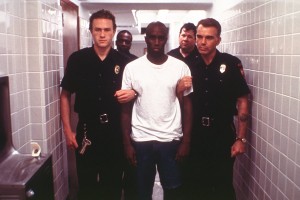 Billy Bob’s first showing of breaking routine is when they bury Ledger, he actually makes a decision, telling the minister not to follow the normal way of things by reading a passage from the bible. The rest of Act II becomes a sort of adjustment period for Billy Bob, he tries to regain his balance and take over the position held by his son, when he calls up the hooker. The whore even says “I haven’t seen you for a while,” to make us more aware of how he’s simply “filling in.” He’s not even used to having a different waitress as when he questions why Berry is there during the late shift, rather than the usual girl. Billy Bob becomes aware of this sort of crushing oppressiveness of symmetry and order when he’s driving to resign and he comes across those prisoners marching in place, impossibly organized and close to each other. When he does finally quit, he talks about being part of a team, and how he wouldn’t be pulling his weight, not able to fulfill his duty of following the rules.
Billy Bob’s first showing of breaking routine is when they bury Ledger, he actually makes a decision, telling the minister not to follow the normal way of things by reading a passage from the bible. The rest of Act II becomes a sort of adjustment period for Billy Bob, he tries to regain his balance and take over the position held by his son, when he calls up the hooker. The whore even says “I haven’t seen you for a while,” to make us more aware of how he’s simply “filling in.” He’s not even used to having a different waitress as when he questions why Berry is there during the late shift, rather than the usual girl. Billy Bob becomes aware of this sort of crushing oppressiveness of symmetry and order when he’s driving to resign and he comes across those prisoners marching in place, impossibly organized and close to each other. When he does finally quit, he talks about being part of a team, and how he wouldn’t be pulling his weight, not able to fulfill his duty of following the rules.
Act III starts when Billy Bob is able to reach out, when he offers Berry a ride home because he knows she has no way of getting there, apart from walking. He has gotten over the confusion of broken routine and now has begun to access his own emotions and make his own decisions. The first time we see him smile in the entire film, is when he comes home to tell Boyle that he bought a gas station. But the movie never gives up in trying to make you feel depressed. The music only has a hint of being hopeful right before possibly nightmarish scenes, such as when Berry discovers the drawings and Billy Bob is oblivious as to what might be around the corner. That said, I am shocked that someone was willing to put up money for this movie, because it never strays from its goal of being straightforward, honest, and downbeat.
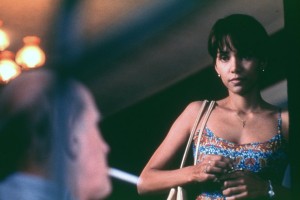 The reason the ending works so well, is because she’s settling for something better than what she had before. It’s a compromise. She’s forced to ask for Billy Bob’s help when she’s evicted from her home, and when she discovers the drawings, she figures that it’s better than nothing. Since she lives an entirely emotional life, and he lives an entirely pragmatic one, they have to compromise in between, so why should she hold him responsible for his prior mistakes? I find that the movie, despite of the type that usually has no replay value, because it is so emotionally wrenching, a feeling that is difficult to recreate, works even better upon subsequent viewings.
The reason the ending works so well, is because she’s settling for something better than what she had before. It’s a compromise. She’s forced to ask for Billy Bob’s help when she’s evicted from her home, and when she discovers the drawings, she figures that it’s better than nothing. Since she lives an entirely emotional life, and he lives an entirely pragmatic one, they have to compromise in between, so why should she hold him responsible for his prior mistakes? I find that the movie, despite of the type that usually has no replay value, because it is so emotionally wrenching, a feeling that is difficult to recreate, works even better upon subsequent viewings.




Danielle Robinson says:
June 26th, 2018
11:15 am
Really really good breakdown of this movie. I hadn’t watched it in FOREVER and came upon the last 15 minutes and said to myself–why didn’t she say anything? Lolol searching for understandings of this movie, yours came right up. Good job!
kate says:
October 26th, 2018
8:40 pm
Thank you for your perception and your insight into this fantastic film. As a member of a Southern family and having grown up before civil rights and the remnants of the past that persist are so well portrayed. I’m thankful it was kicked around for awhile until it became what it is. I’ve avoided it for years but now was the right time.Real and moving.
Monique Mccullough says:
January 27th, 2019
1:02 am
This is a perfect breakdown of this movie